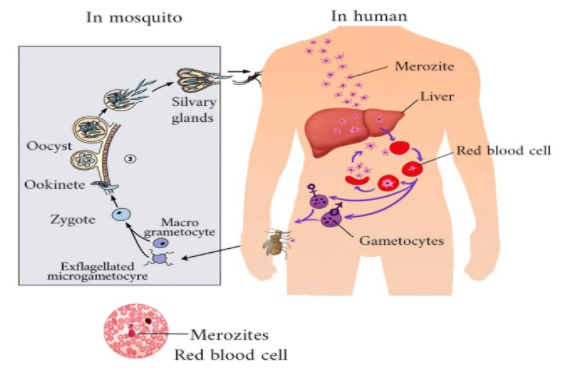
Which of the following is a protozoan disease?
(a)Malaria
(b)Typhoid
(c)AIDS
(d)Cholera
Answer
591.6k+ views
Hint: Disease caused by the bite of a mosquito carrying disease-causing parasite in the salivary gland. This disease was formerly known as ague or marsh fever. The name of the disease has originated from medieval Italian.
Complete answer:
Malaria is a protozoan disease caused by Plasmodium sp. transmitted by the female anopheles mosquito. The malaria parasite completes its life cycle in two hosts- the first one is the exogenous sexual phase in the mosquito during which the parasite multiplies called sporogony and second is endogenous asexual phase in the vertebrate or human host called schizogeny.

Additional Information:
-In human malaria is caused by Plasmodium falciparum, Plasmodium vivax, Plasmodium ovale, Plasmodium malariae, and Plasmodium knowlesi.
-Malaria parasite life cycle in humans is of four-phase- pre-erythrocytic schizogony phase, erythrocytic schizogony phase, gametogony phase, and exoerythrocytic schizogony phase.
-Sporozoites of malaria are present in the salivary gland of mosquito and transmitted to humans by mosquito bites where sporozoites are introduced into the blood.
-The development phase of malaria sporozoites takes place in the liver of humans where multiple nuclear divisions develop schizont containing numerous merozoites.
-Numerous merozoites are released and enter in red blood cells by the receptor for merozoites in the glycoprotein.
-Malaria disease first onset appears after the incubation period of 9-14 days, where patients may not appear to be ill.
-The common symptoms of malaria disease are- fever, headache, chills, and vomiting appear for up to 10-15 days after the person is infected by the malaria parasite.
So, the correct answer is, ' Malaria.’
Note: -P. vivax infects young red blood cells and P. malariae infects old red blood cells.
-P.falciparum infects all ages of red blood cells.
-Clinically malaria is divided into three stages- Stage I- cold stage; Stage II- hot stage; and Stage III- sweating stage.
Complete answer:
Malaria is a protozoan disease caused by Plasmodium sp. transmitted by the female anopheles mosquito. The malaria parasite completes its life cycle in two hosts- the first one is the exogenous sexual phase in the mosquito during which the parasite multiplies called sporogony and second is endogenous asexual phase in the vertebrate or human host called schizogeny.

Additional Information:
-In human malaria is caused by Plasmodium falciparum, Plasmodium vivax, Plasmodium ovale, Plasmodium malariae, and Plasmodium knowlesi.
-Malaria parasite life cycle in humans is of four-phase- pre-erythrocytic schizogony phase, erythrocytic schizogony phase, gametogony phase, and exoerythrocytic schizogony phase.
-Sporozoites of malaria are present in the salivary gland of mosquito and transmitted to humans by mosquito bites where sporozoites are introduced into the blood.
-The development phase of malaria sporozoites takes place in the liver of humans where multiple nuclear divisions develop schizont containing numerous merozoites.
-Numerous merozoites are released and enter in red blood cells by the receptor for merozoites in the glycoprotein.
-Malaria disease first onset appears after the incubation period of 9-14 days, where patients may not appear to be ill.
-The common symptoms of malaria disease are- fever, headache, chills, and vomiting appear for up to 10-15 days after the person is infected by the malaria parasite.
So, the correct answer is, ' Malaria.’
Note: -P. vivax infects young red blood cells and P. malariae infects old red blood cells.
-P.falciparum infects all ages of red blood cells.
-Clinically malaria is divided into three stages- Stage I- cold stage; Stage II- hot stage; and Stage III- sweating stage.
Recently Updated Pages
Master Class 12 Economics: Engaging Questions & Answers for Success

Master Class 12 Physics: Engaging Questions & Answers for Success

Master Class 12 English: Engaging Questions & Answers for Success

Master Class 12 Social Science: Engaging Questions & Answers for Success

Master Class 12 Maths: Engaging Questions & Answers for Success

Master Class 12 Business Studies: Engaging Questions & Answers for Success

Trending doubts
Which are the Top 10 Largest Countries of the World?

What are the major means of transport Explain each class 12 social science CBSE

Draw a labelled sketch of the human eye class 12 physics CBSE

What is a transformer Explain the principle construction class 12 physics CBSE

Why cannot DNA pass through cell membranes class 12 biology CBSE

Differentiate between insitu conservation and exsitu class 12 biology CBSE




